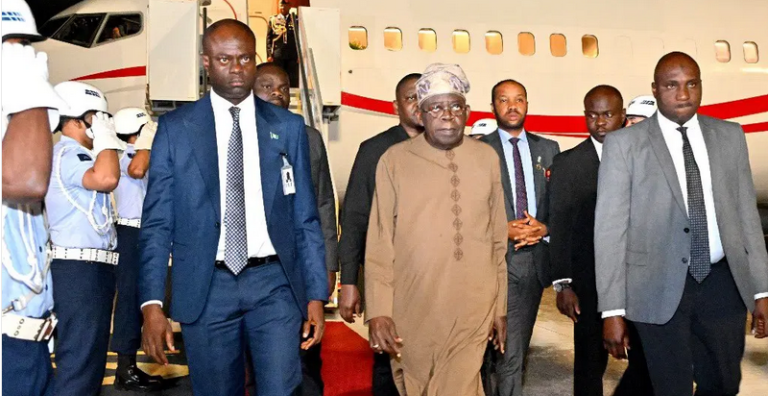PRESIDENT Bola Tinubu has arrived in Rio De Janeiro, Brazil, ahead of the 17th Summit of BRICS countries.
The president’s aircraft touched down at the Galeão Air Force Base at 8:45 p.m. on Friday, where he was received by the commander of the base, Brazil’s deputy minister for Africa and the Middle East, Ambassador Carlos Sergio Sobral Duarte, and the deputy minister for trade promotion, science, technology, innovation, and culture.
President Tinubu is attending the summit at the invitation of President Luiz Inacio Lula da Silva of Brazil, on the strength of Nigeria’s status as a ‘partner country’- a membership category short of full status.
The Partner status is an upgrade from its previous guest status, which the country had enjoyed over the years.
Nigeria was formally admitted as the ninth BRICS partner country in January 2025, a status introduced at the 16th BRICS Summit in October 2024.
As a partner country, Nigeria can participate in BRICS meetings, summits, and initiatives, contributing to discussions and official documents.
The word BRICS was coined from the names of the pioneer nations of Brazil, Russia, India, China and South Africa, which came together under an informal grouping of emerging economies. It also comprised six coalition members, such as Egypt, Ethiopia, the United Arab Emirates UAE, Iran, Saudi Arabia and Indonesia, which joined in 2024.
The 2025 summit is held from July 6-7 with special attention on ‘Global Governance reform’ and ‘cooperation among the Global South Community.’
BRICS leaders meeting from Sunday are expected to decry Donald Trump’s hardline trade policies, but are struggling to bridge divides over crises roiling the Middle East.
Emerging nations representing about half the world’s population and 40 per cent of global economic output are set to unite over what they see as unfair US import tariffs, according to sources familiar with summit negotiations.
Since coming to office in January, Trump has threatened allies and rivals alike with a slew of punitive tariffs.
His latest salvo comes in the form of letters due to be sent starting Friday, informing trading partners of new tariff rates expected next week on July 9.
Diplomats from 11 emerging nations, including Brazil, Russia, India, China and South Africa, have been busy drafting a statement condemning the economic uncertainty.
Any final summit declaration is not expected to mention the United States or its president by name. But it is expected to be a clear political shot directed at Washington.
“We’re anticipating a summit with a cautious tone: it will be difficult to mention the United States by name in the final declaration,” Marta Fernandez, director of the BRICS Policy Center at Rio’s Pontifical Catholic University, said.
This is particularly the case for China, which has only recently negotiated with the US to lower steep tit-for-tat levies.
“This doesn’t seem to be the right time to provoke further friction” between the world’s two leading economies, Fernandez said.
Conceived two decades ago as a forum for fast-growing economies, the BRICS have come to be seen as a Chinese-driven counterbalance to Western power.
But the summit’s political punch will be depleted by the absence of China’s Xi Jinping, who is skipping the annual meeting for the first time in his 12 years as president.
“I expect there will be speculation about the reasons for Xi’s absence,” said Ryan Hass, a former China director at the US National Security Council who is now with the Brookings Institution think tank.
“The simplest explanation may hold the most explanatory power. Xi recently hosted Lula in Beijing,” said Hass.
The Chinese leader will not be the only notable absentee. War crime-indicted Russian President Vladimir Putin is also opting to stay away, but will participate via video link, according to the Kremlin.
Hass said Putin’s non-attendance and the fact that India’s prime minister will be a guest of honour in Brazil could also be factors in Xi’s absence.
“Xi does not want to appear upstaged by Modi,” who will receive a state lunch, he said.







